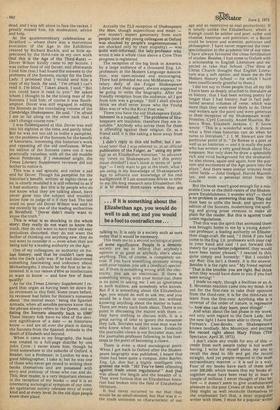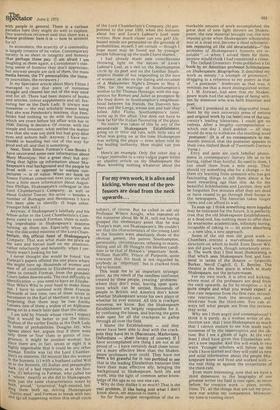. .. if it is something about the Elizabethan age,
you would do well to ask me; and you would be a fool to contradict me...
talking to. It is only in a society such as ours, today that it would be necessary.
This leads me to a second sociological point ,of some significance. People in a demotic society are led to believe that anybody's opinion is as good as anybody else's about anything. This, of course, is completely untrue. If you have something seriously wrong with your insides, you ask a (medical) specialist; if there is something wrong with the electricity, you ask an electrician. If there is something wrong with your motor-car, there is no point in asking me: I am an ignoramus in such matters, ask somebody who knows. But if it is something about the Elizabethan Age, you would do well to ask me; and you would be a fool to contradict me, without knowing anything about the matter in hand. There are many such fools about. There is no point in discussing the matter with them — they have nothing to discuss with.. It is a great saving of time to ignore the nonsense they talk. Socrates said the wise man was he who knew when he didn't know. Evidently the journalist-clown is not Socrates' man, nor the journalist-professor following in his footsteps to the point of becoming a clown.
There is even a third sociological point. When I got back to Oxford after the Shakespeare biography was published. I heard that there had been quite a rumpus. John Bayley, Eng. Lit. don but a highly intelligent one, greeted me with "Hi! You've been offending against trade union regulations!" And that was about the length and the breadth of it. They were furious that an Elizabethan historian had broken into the field of Elizabethan literature.
It had never occurred to me that they would be so small-minded, but that was it — the trade unionism so characteristic of our age and so restrictive to real productivity. It is totally unlike the Elizabethans, where a Raleigh could be soldier and poet, sailor and chemist, historian and politician; or a Bacon could be lawyer and scientist, politician and philosopher. I have never respected the overspecialisation in the academic life of our time; I have always favoured the cross-fertilisation of studies. Besides. I had come to Oxford with a scholarship in English Literature and expected to take that School. (The dons at Christ Church thought that English Literature was a soft option, and made me do the Modern History School — for which I have been insufficiently grateful to them.) I did not say to these people that all my life I have been as deeply attached to literature as to history, that I had been writing poetry far longer than I had history, had in fact published several volumes of verse, which was more than they were ever likely to do. Other real writers saw the point and were generous in their reception of my Shakespeare work: Priestley, Cyril Connolly, Andre Maurois, Rebecca West, Elizabeth Jenkins. C. P. Snow wrote: "This is a wonderful work. It shows what a first-class historian can do when he turns to literature." J. I. M. Stewart saw the particular point of it: " Dr Rowse is a poet as well as an historian — and it is really the poet who has written a very good book about Shakespeare. Not only does he draw a splendidly rich and vivid background for the dramatist; he also shows, again and again, how the passion and excitement of the Age pours into the plays." And there were similar tributes from other fields — John Gielgud, Harold Macmillan, and even a personal letter from De Gaulle.
But the book wasn't good enough for a miserable Crow or the third-raters of the Shakespeare Establishment. I wonder why? — there is no problem in answering that one. They did their best to stifle the book, and ignore my edition of the Sonnets, modernising the spelling, and giving prose versions to make all plain for the reader. But this is against trade union regulations.
That this was the spirit that animated them was brought home to me by a young American professor, a leading authority on Eiizabe• • than stage-craft. He said, "I think if you had, come to the Eng. Lit. professors with your cap . in your hand and said 'I put forward this. theory for your better judgement they would have been better pleased." I reacted to this, quite simply and honestly: "But I couldn't say that: this isn't a theory, it is the answer. Besides it is the right one." My friend replied: "That is the trouble: you are right. But think what they would have done to you if you had
been wrong!" • I made no reply, though a Swiftian or an A. E. Housman reaction came into my mind: it is not for the first-rate to take their opinions from the third-rate; it is for the third-rate to learn from the first-rate. Anything else is a reversal of the order of nature, is regressive "— how else can they learn, poor things? • . • And what about the last phase in my work, not only with regard to the Dark Lady, but the new light I have been able to throw, from Forman's Case-Books, on Shakespeare's known landlady, Mrs Mountjoy, and putting the record right about Mary Fitton (The Spectator, April 26, 1973).
1 don't claim any credit for any of this — credit from such people today is not worth having. I write for myself alone, my aim to recall the dead to life and get the record straight. And yet people respond in the most extraordinary manner — it is sad in a way. Four of my books have each of them sold, over 300,000; which means that my books altogether, must have been read by at least a couple of millions. I never thought of that before — it doesn't seem to give unadulterated pleasure to the poor Crows of this world. But they might as well reconcile themselves to the unpleasant fact that, a most unpopular writer with them, I must be a popular writer with people in general. There is a curious Paradox here they might do well to explore. One querulous reviewer said that there was a Rowse problem: here it is — how to account for it?
In economics, the scarcity of a commodity is largely creative of its value. Contemporary society is so short in integrity and honesty that perhaps these pay. (I am afraid I am laughing at them again, a Cornishman's sidelong sense of humour they don't appreciate; but anyway people are sick of them, the mass media heroes, the TV personalities, the literary journalists, the reviewers.)
. In my Spectator article about Mary Fitton I managed to put that . piece of nonsense straight and cleared her out of the way once and for all. There had been dozens of books and articles, colour supplements and all, featuring her as the Dark Lady. It always was nonsense — the real scholarly reason being that she was Pembroke's mistress, that Pembroke had nothing to do with the Sonnets .which are years before his affair with her in ,1600. Dating is decisive. Of course, with the simple and innocent, what settled the matter was that she was not dark but had grey-blue eyes and auburn hair. Anyway, I have succeeded in bundling her out of the way for good and all, and that is something.
Next, from Simon Forman's Case-Books I have uncovered some new information about Mary Mountjoy. Not a great deal; but anything that lights up information about Shakespeare's real background and the people he lived with — as opposed to useless conjectures — is of value. When my book on Simon Forman comes-out next year We shall have a little more information about Augustine Phillips, Shakespeare's colleague in the Lord Chamberlain's Company, as well as about Gabriel Towne, the actor — besides a . number of Burbages and Henslowes I have not been able to identify. (I hope other, Younger folk will.) Anyway, if Shakespeare's landlady and his fellow-actor in the Lord Chamberlain's ComPany came to consult Forman, there is nothing improbable in Shakespeare's mistress turning up there too. Especially when she was the discarded mistress of the Lord Chamberlain, the„ official head of Shakespeare's Company. That was what made me prick up my ears and forced itself on my attention, rather reluctantly and belatedly, when I certainly wasn't looking for her. I never thought she would be found. Yet Forman's papers offered the one place where She might turn up. Hundreds of women and Men of all conditions in Elizabethan society Came to consult Forman, from the grandest Court-ladies downwards. The real difficulty is identification — you need to have an Elizabethan Who's Who in your head to make them out. I have to contend with three Frances Huwards at one time, two of them wives in succession to the Earl of Hertford; so it is not surprising that there may be two Emilia Laniers, one of them a widow of an Alphonse going on to a much later date than the other.
I am told by friends whose views I respect that it would be better to put the identification of the earlier Emilia as the Dark Lady in terms of probabilities. Douglas Jay, who agrees about her, argues that if there were Only three or four clues or points of congruence, it might be another woman; but since there are, in fact, seven or eight it is highly improbable that it could be any other Woman Emilia was (a) the Lord Chamber!ain's ex-mistress, (b) musical like the woman in the Sonnets, (c) with a husband called Will as in the Sonnets, (d) Italian and presumably dark, (e) of a bad reputation, as in the Sonnets, (f) behaving to Forman, who called her a ' whore,' exactly as she did to Shakespeare, i!vith just the same characteristics noted by ,°Otn. 'proud,' tyrannical,' high-minded, biduing them both up, driving Shakespeare ' frantic-mad ' and Forman to break with her; Land (g) all happening within this small circle
of the Lord Chamberlain's Company, (h) pinpointed to the year 1593, when the Sonnets about her and Love's Labour's Lost were written. How much closer can you get? Unbiased minds are persuaded on the grounds of probabilities; myself. I am certain — though I hope more may be found out by younger people following up the trails I have started.
I had already made new contributions throwing light on the nature of Love's Labour's Lost, as a skit on the Southampton circle by its poet and on the familiar Southampton theme of not responding to the love of women; as also on the dating and occasion of A Midsummer Night's Dream to May 2, 1594, for the marriage of Southampton's mother to Sir Thomas Heneage; with the suggestion for Romeo and Juliet as prompted by the feud down in Southampton's neighbourhood between his friends, the Danvers brothers and the Longs, whose son and heir they killed. John Florio, Southampton's tutor, turns up in the affair. One does not have to look far for the Italian flavouring of the plays.
No notice was taken of this by any of the second-rate Shakespeare Establishment. going on in their old ruts, with little idea of what was going on at the time Shakespeare was writing the plays — even when told by the leading authority. How stupid can you be?
Here's an example. Only the other day a vulgar journalist in a very vulgar paper wrote an abusive article on my Shakespeare the Man, knowing nothing whatever about the



































 Previous page
Previous page